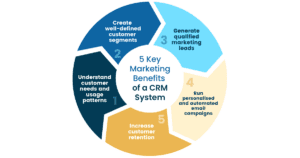
Have you ever noticed how some brands always pitch you the right offers at the right time and price? That’s one of the benefits of CRM software.
The best CRMs help small business owners collect, organise, and manage customer data. They also provide valuable insights to help you define sales processes and design marketing campaigns tailored to your audience’s needs. In this article, we’ll share the key benefits of today’s CRM systems for small businesses and show how you can use them to create better marketing campaigns.
What is a CRM?
Customer Relationship Management (CRM) software is a technology that allows you to track customer communication with your brand, collect and organise customer information, and provide real-time engagement insights to your marketing team members, sales reps, and customer service teams, along with any other key stakeholders.
These insights allow you to provide a consistent and memorable customer experience throughout the customer’s lifetime, increasing their satisfaction with your product and loyalty to your brand.
Most people think a CRM solution improves customer service, and that’s true. But it also directly impacts the marketing, sales, and branding of your small business. Modern CRMs offer everything from demand and lead generation to marketing automation and customer retention tools.
In short, you can consider a CRM your one-window solution to optimise your customer experience management.
Benefits of a CRM for marketing

CRMs offer numerous direct and indirect marketing benefits to your small business. Let’s discuss the most prominent ones.
CRM marketing benefit #1: Understand customer needs and usage patterns
Effective marketing relies on accurate metrics and data insights that allow you to make informed decisions and take calculated risks. This is where a CRM is so valuable for your small business.
It tracks customer interactions across all your marketing channels (website, landing pages, product usage, email, support ticketing, social media, phone, and chat) and provides an accurate picture of your customer’s needs. A CRM also helps you understand the real problems and needs of your potential customers so you can craft relevant marketing campaigns that speak directly to them.
For example, a CRM allows your service teams to regularly share customer feedback, complaints, or feature requests with your marketing and product teams. This helps them understand the core problems of your customers and what features they want to see in your product.
CRM marketing benefit #2: Create well-defined customer segments
Customer segmentation is a fundamental marketing concept because generic marketing campaigns don’t work anymore. According to research, 80 percent of customers respond positively to marketing campaigns tailored to their interests and needs.
One of the main advantages of a CRM system is that it enables multi-level segmentation in your audience based on interests, location, usage patterns, engagement, satisfaction level, and other criteria.
This allows you to design highly targeted marketing campaigns that speak specifically to that segment. For example, you can send special offers to users in a specific geographic location. Or you could target the customers with the highest satisfaction rating for upsell offers because they’re more likely to convert.
All of this is possible with an integrated CRM system, as it tracks and records all customer activity and gives you the tools for advanced segmentation.

CRM marketing benefit #3: Generate qualified marketing leads
CRMs not only help you improve customer satisfaction but also define your sales cycle by providing you and your salespeople with advanced lead-generation tools such as landing pages and opt-in forms to convert traffic into subscribers and leads.
To improve lead quality, you can ask specific questions at sign-up or offer lead magnets in exchange for the customer’s contact information to help you understand a lead’s interests and business needs. Adding tracking scripts to your landing pages allows you to enable retargeting campaigns on Facebook, Google, and other advertising networks.
CRM marketing benefit #4: Run personalised and automated email campaigns
With an ROI of $36 for every dollar spent, email marketing is among the most profitable and engaging marketing channels. Modern CRMs offer integrated marketing automation with advanced email marketing automation features that help you regularly engage your customers and prospects and build a value-based relationship with them.
Here are a few example scenarios to show you what’s possible with an integrated CRM and email marketing automation solution.
Scenario #1: Say a visitor converts into an email subscriber from your landing page. You can then send them a welcome email sequence that introduces them to your product and shows how it will help them grow their business.
Scenario #2: Automated follow-up emails are a great tool to use when a customer doesn’t engage with your product for a specific time period or has a low satisfaction rating.
Scenario #3: Completely automate your marketing and sales messaging with predefined email sequences and workflows for different customer lifecycle stages. For example, by configuring weekly engagement emails that share product tips and tutorials, you’ll help customers get more value from your product.
Scenario #4: Create email sequences for customers entering the final quarter of their tenure with your product. Your sequences can include a mix of engagement, marketing, and sales emails to encourage early renewal.
A CRM empowers you with these automation features because it has all the critical data on all the relevant customer touchpoints. You can even create automation templates based on the most frequent marketing scenarios to save time.

CRM marketing benefit #5: Increase customer retention
Research shows that selling to an existing customer has a 60–70 percent chance of success. In comparison, selling to a new prospect is only likely to succeed 5–20 percent of the time. That’s why customer retention is such a critical part of any organisation’s marketing strategy.
A CRM facilitates customer retention and improves customer loyalty by helping you provide customers with a memorable experience throughout their tenure. Plus, it highlights the most and least likely retention prospects based on their satisfaction and product usage patterns.
These insights help you proactively approach customers to resolve problems, increase their renewal chances, and improve sales forecasting.
Satisfied customers also tend to recommend your product in their circles, resulting in word-of-mouth marketing and referral sales.
How to use your CRM for marketing
With a modern integrated CRM and marketing automation solution, you can automate a significant part of your marketing strategy and fill your sales pipeline. For example, you can create landing pages for lead generation by adding relevant lead magnets and opt-in forms.
These landing pages are directly integrated with your email marketing system. Once a visitor converts into a subscriber, your email marketing system can immediately trigger a welcome email sequence and keep engaging subscribers with new and relevant emails. When subscribers convert into customers, your CRM can track their usage patterns and gauge satisfaction through periodic surveys.
If a customer approaches your services team with a complaint or suggestion, the system can automatically share it with your customer support and sales teams. You can also trigger activity-based marketing campaigns with your CRM. For example, you can send emails and SMSs or show relevant products to users who visit a specific page on your site or engage with a marketing campaign.
Overall, a CRM empowers you by gathering priceless customer information in a centralised database and giving you the tools to achieve your marketing and sales goals.
Is your marketing strategy benefiting from a CRM system?
A CRM tool streamlines your data and provides valuable customer insights and helps you make informed marketing decisions instead of relying on guesswork. So, if you’re not using an integrated CRM and marketing automation solution to power your marketing strategy, now’s the time to Act!. Try Act! for free for 14 days now. No downloads or credit cards are required.






